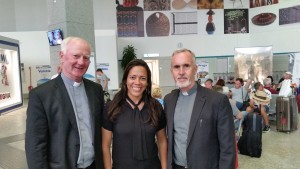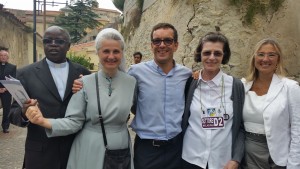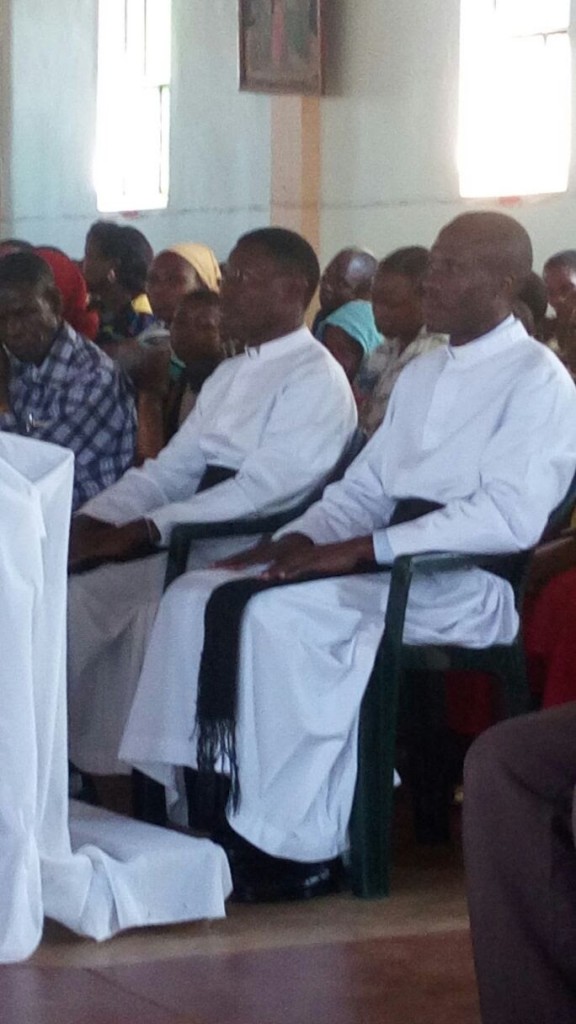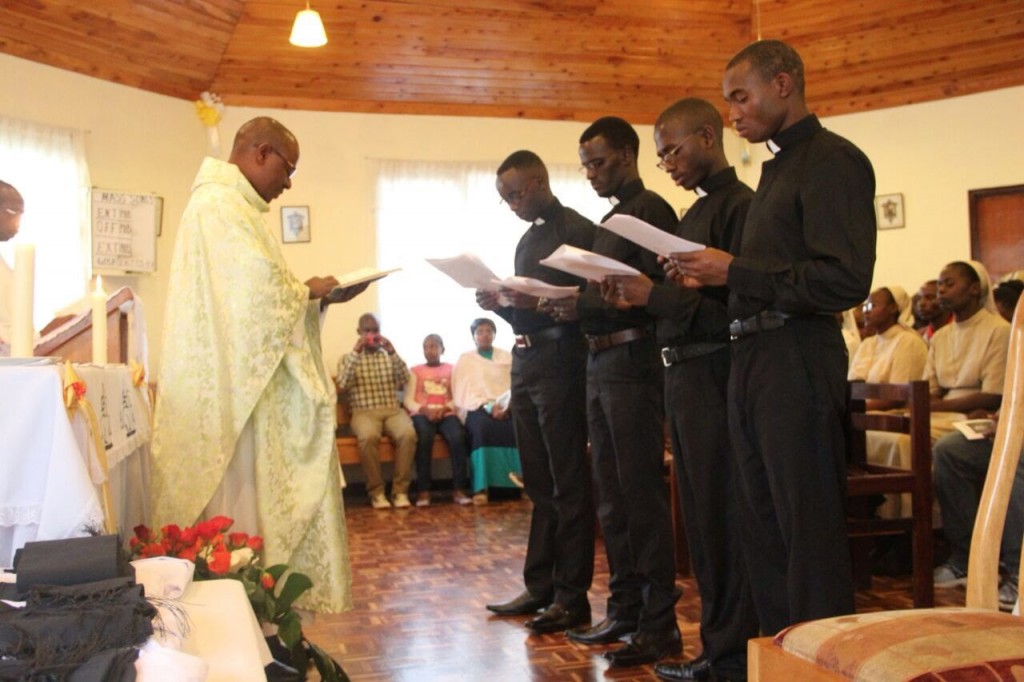Category Archives: ARTICLES
DEPRESSION (A Poem)

Depression turnsPhysical Not content With breaking Heart and Soul and Mind It assaults Flesh and bone The very marrow Its dark heavy sadness Pressing down Upon the head Taking possession Of every single fibre Leaving the body Restlessly ill An Continue reading DEPRESSION (A Poem)
Pope Francis Meets Pallottines
Status
Pope Francis meets with Pallotine Fathers
2016-10-10 Vatican Radio
(Vatican Radio) Pope Francis on Monday greeted members of the General Assembly of the Pallotine Fathers.
Pope Francis spoke of the charism of St. Vincent Pallotti, who founded the order in Rome in 1835, saying he was “blessed to recognize that Jesus is the Apostle of the Father – rich in mercy and full of mercy – [Christ] is the one who fulfills his mission by revealing to everyone the tender love and the infinite mercy of the Father.”
“Contemplating the life of Jesus and looking at our life as pilgrims in this world with its many challenges, we feel the necessity of a profound conversion and the urgency of reviving faith in Him,” – Pope Francis said – “This is the only way we can serve our neighbor in charity! Every day we are called to renew our
trust in Christ and from his life draw inspiration to fulfill our mission because ‘Jesus is the first and greatest evangelizer. In every activity of evangelization, the primacy always belongs to God, who has called us to cooperate with him and who leads us on by the power of his Spirit.’”
http://www.news.va/en/news/pope-francis-meets-with-pallotine-fathers
http://www.news.va/en/news/pope-francis-meets-with-pallotine-fathers
INDIFFERENCE: Aggressive And Silent
Status
“The opposite of love is not hate, it’s indifference.
The opposite of art is not ugliness, it’s indifference.
The opposite of faith is not heresy, it’s indifference.
And the opposite of life is not death, it’s indifference.”
(Elie Wiesel)
 The sin of the rich man in the Gospel (Luke 16:19-31) is not so much that he is rich or that he eats very well – though these insulate him from the harsher realities beyond him – his sin is that of indifference, his indifference to the agony being experienced by the poor man Lazarus outside his gate. He is indifferent, unmoved, does nothing to help.
The sin of the rich man in the Gospel (Luke 16:19-31) is not so much that he is rich or that he eats very well – though these insulate him from the harsher realities beyond him – his sin is that of indifference, his indifference to the agony being experienced by the poor man Lazarus outside his gate. He is indifferent, unmoved, does nothing to help.
It’s clear from the gospel that the rich man has to account for his indifference before God and that he has to bear the consequence of it for eternity, an eternity in which he is plunged into the agony that he ignored in Lazarus while the latter is lifted up into heaven.
The path of holiness, the path to eternal life is one of attentiveness to the one who is in need and this gospel forces me to ask myself if there is something, and more importantly someone, that I am ignoring at this time in my life – someone within my home or someone outside.
Pope Francis reminds us that this is an age in which we have become indifferent as a society. We are indifferent to the environment, to climate change and it’s negative impact on poorer countries; we are indifferent to the trafficking of women and children and other forms of modern enslavement; we are indifferent to the fate of the child in the womb; our government has a practical indifference to the plight of the homeless, the poorest and most vulnerable of our society. And our society has become indifferent to God which is the most fundamental indifference of all.
In Dublin we witnessed a march organized by the Abortion Rights Campaign calling for the repeal of the 8th Amendment. They say that 20,000 took part in it and some of the language used showed an aggressive indifference to the life of the child in the womb, an indifference that speaks of the child in the womb in inhuman terms, that seeks to take away the equal right to life of the child. That’s what we’re talking about – an equal right to life, not a superior right to life – and they want to take that right away. This is a society that went to great lengths to demonstrate its commitment to equality in last year’s marriage referendum. So where is the equality now?
This aggressive indifference to the equal rights of the child is accompanied by our own silent indifference. It’s likely that most people, most Catholics will go along with the campaign to repeal the 8th and if we do then we, like the rich man in the gospel, will have to account before God for our silent indifference and we will have to live out its consequences.
For Pope Francis the solution to indifference is mercy – mercy in the sense of developing that innate instinct of reaching out to do the right thing at the right time. Reaching out to feed the poor, clothe the naked, house the homeless, represent the voiceless.
Within the context of our relationships mercy is not just reaching out to help and sometimes the help we give can in fact be mercy-less because it’s not what the other needs. Sometimes I need you to just leave me alone, stop hassling me, stop crowding me or just stop talking.
Siblings get tangled in each other from time to time, sometimes very often – they can fight like a bag of cats as I did myself as a child. But in the moment of need they will stand up for each other.
An example of it happened with my two young nieces aged 7 and 5 at the time. I’m sitting in the house reading, while the older niece Katie is colouring, when the younger Laura comes to the back door to say that a bigger child outside has taken her doll and won’t give it back. With that Katie put down her pen went straight out the door, went up to the bigger child, took the doll off her, came back and gave it to her sister. And then simply resumed her colouring.
This was a display of mercy that is necessary, simple, direct and childlike. It has something to teach us adults who spend too much time thinking – or maybe not thinking at all – and not enough doing the thing that is necessary.
And it brings another question to mind – who is the bigger one, the power, who has taken my doll and what is the doll that needs to be retrieved?
“Fight the good fight of the faith and win for yourself the eternal life to which you were called when you made your profession and spoke up for the truth in front of many witnesses… before God the source of all life and before Christ, who spoke up as a witness for the truth in front of Pontius Pilate” (1 Timothy 6:11-16)
Picture taken from: http://johnfenzel.typepad.com/john_fenzels_blog/2008/01/the-true-meanin.html
Blessed Elizabeth Sanna: Reflection on The Beatification Ceremony – Fr. Derry Murphy SAC
Status
Blessed Elisabetta Sanna, member of the Union of Catholic Apostolate.

The Rite of Beatification of Elisabetta Sanna took place in the home parish of Elisabetta in the Basilica of the Most Holy Trinity, in Saccargia, Codrongianus, Sardinia, on Saturday 17 September. The Principal Celebrant at the out-door concelebrated Mass was Cardinal Angelo Amato, Prefect of the Congregation for the Causes of the Saints. Cardinal Amato was accompanied by the Archbishop of Sassari, other Bishops from Sardinia, Mgr Julio Ende Akamine, SAC, a Pallottine Bishop from Sao Paulo, and a very large number of priests. The Pallottine Family was well represented with almost 60 priests, brothers and seminarians from around the world, this number included Frs. John Kelly, Derry Murphy and Rory Hanly, General Secretary of the Union of Catholic Apostolate; and with Sr. Ivete Garlet, CSAC, General Superior of the Pallottine Sisters and the General Council; Sr. Izabela Swierad, SAC, General Superior of the Pallottine Missionary Sisters, and the General Council; Sr. Adalgisa Cammarata, of the Eucharistic Sisters of St. Vincent Pallotti and by many Pallottine Sisters of both Congregations; Ms. Donatella Acerbi, President of the UAC was there and was accompanied by members of the Quinta Dimensione Community of which she is a member, and there were lay members of the Union of Catholic Apostolate from Italy, Brazil, Australia and Poland and friends of the Pallottine Family present. It all it is estimated that almost 6,000 persons took part in the open-air Mass of Beatification.

In order to be a candidate for Beatification it is necessary to have a miracle attributed to the person in consideration; a miracle attributed to the intercession of Elisabetta Sanna occurred on 18 May 2008 in Niteroi, Brazil. A 31 year old woman, Suzana, had surgery to remove a cancerous tumour from her forearm in 2003, following the surgery the muscles in her forearm and right hand atrophied and she lost all mobility in the forearm and hand. Suzana frequented a Pallottine parish in Niteroi, close to Rio de Janeiro, and in 2007 she heard of Elisabetta Sanna and because Elisabetta also had suffered a disability in her arms she began to pray to her daily. On 18 May 2008 in the Blessed Sacrament Chapel in the parish church in Niteroi, while praying, Suzana rested her right arm on the altar and after a while felt a tingling in the arm and gradually, over the course of an hour, recovered full use of the hand and arm. This healing was certified by a doctor on 4 June and further medical inspections confirmed this; the Holy See subsequently certified the miraculous nature of the healing through the intercession of Elisabetta Sanna. Suzana was present at the Beatification and it was a special joy to speak with her and listen to her recount the experience of a miraculous healing.
Derry Murphy, SAC.

First Consecrations In Nairobi
Status
General Assembly 2016
Status
LOSS – The Need To Be Found – Eamonn Monson SAC
Status
In the early 1960’s things were hard economically and my mother never tired of reminding us that “money doesn’t grow on trees” and that it was hard to “make ends meet.” So she was understandably furious when my older sister Maura, who was about 8 years old, lost the thrupenny piece on the way to the shop to get something for the tea. I was with Maura when she decided to throw the money in the air to see if she could catch it. She didn’t and it got lost in the grass. It was a dark winter’s evening. The searching was intense. And it was in vain. The value of it in today’s buying power would be about €15 and it must have been near the end of the week and there was no more money. It was a very frustrating reality when you had children to feed.
My mother, like all of us, used to stress from time to time over the loss of hard earned material things and then came the day when she lost her daughter. Maura didn’t wake up one morning and all of our experience of loss reached an altogether different level.
Loss is such a significant part of life. The loss of money, precious material things, loss of a job, loss of relationships, loss of our own good name, loss of self-esteem or we lose our way in life. The list goes on. Sometimes what is lost is regained, like the lost sheep or the lost coin in the gospel. And often what’s lost is gone forever.
An area of loss that we are often not alert to is the spiritual loss that is so prevalent now and we don’t seem to know that it’s happening at all. Jesus asks, “what does it profit a person to gain the whole world and lose one’s very soul?”
The loss of soul and spirit happens when we let go of God – like a little child letting go of his mother’s hand in a crowded place, ending up lost until he is found. Children cannot find themselves. They need to be found.
We similarly let go of the hand of God when we stop praying, stop believing, give up receiving Christ in the Eucharist, the mercy of God in confession; when we lose sight of the values that Christ has given us – especially the value and sacredness of every single human life.
We are a society that has become lazy and indifferent to the lives of others, the hidden, silent, insignificant lives. We respond very generously when the plight of another is put dramatically before us but we allow the powers of the world to tell us that some lives are of less value than others, have less a right to life than others. When we allow this to happen then we have lost our way and become seriously disconnected from God.
The Italian culture has long been very family and person centered, this in large part being due to the prominent place given to God in their lives. The same has been true of our own Irish culture, where faith in God expressed itself in a welcome for the stranger. But things in Italy have changed, things in ireland have changed. The human person, especially the poor stranger is often disregarded and perhaps God also is being disregarded in our modern cultures.
 Rome is full of beggars who have discovered that, in order to attract the sympathy of the rich, it’s necessary to have a dog by your side. I saw this one day outside our church of San Silvestro. The beggar man and his dog were sitting there against the wall. Two well-to-do elderly ladies came along, went over to the dog, were effusive in their admiration of it, put money in the bowl but they completely ignored the man. There’s something seriously wrong here when it is the animal and not the person that arouses our sympathy.
Rome is full of beggars who have discovered that, in order to attract the sympathy of the rich, it’s necessary to have a dog by your side. I saw this one day outside our church of San Silvestro. The beggar man and his dog were sitting there against the wall. Two well-to-do elderly ladies came along, went over to the dog, were effusive in their admiration of it, put money in the bowl but they completely ignored the man. There’s something seriously wrong here when it is the animal and not the person that arouses our sympathy.
Today God reveals himself as the God who searches for the lost – He is the woman searching for the coin, the farmer searching for the sheep, the mother searching for her lost daughter, the father for his lost son.
Whether we are lost in a personal way, or lost as a society, the certainty of the Gospel is that God is out there looking for us. Jesus is the one who pleads on our behalf, bleeds on our behalf. And God’s mercy is that He should find us and bring us back to the place where we belong, to the fullness of joy in His presence and in the presence of each other.
God’s mercy is that we should not be defined by our loss but by our being found. As church we are given the Godly task of seeking and finding every single lost person in the world in whatever way they are lost, the sacred duty of finding and bringing home.
https://huruma55.wordpress.com/2016/09/10/loss-the-need-to-be-found/
PROFESSIONS SEPTEMBER 12, 2016
Status
Perpetual Consecrations In East Africa
Status
On September 8, 206 Norbert Mukabwa SAC and Stephen Lwebuga SAC made  their Perpetual Consecration as Pallottines. The ceremony took place in the church of Our Lady of Sorrows, Galapo, Tanzania with Fr. John Onna SAC as the mai
their Perpetual Consecration as Pallottines. The ceremony took place in the church of Our Lady of Sorrows, Galapo, Tanzania with Fr. John Onna SAC as the mai
n celebrant. Norbert, from Kenya, will spend his pastoral year in Makiungu and Stephen, from Uganda, will spend his pastoral year in Dagoreti Market, Nairobi.
We wish them every blessing and happiness in their personal lives and ministry, thanking them for giving themselves so generously to God and His People.
May Our Lady Queen of Apostles, Mother of Divine Love and St. Vincent Pallotti be their constant companions and guides.






